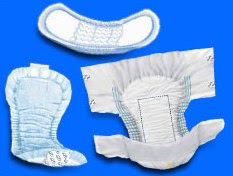Anyone who has ever dealt with incontinence either personally or with a loved one knows that it can be extremely embarrassing and difficult to discuss, making it nearly impossible to get the right facts. If you or someone you know is suffering from incontinence these are some common myths and concerns that you should be aware of:
Incontinence Only Affects the Very Old
FALSE. Incontinence is actually very common. According to the National Association for Incontinence (NAFC), incontinence characteristically affects more women than men. At some point in their lives 1 out of every 4 women and 1 out of every 8 men will experience incontinence. In fact, bladder weakness affects more people under the age of 53 than over. If the person you care for feels embarrassed by their incontinence then they should be reassured to know that they are not alone.
Don’t Discuss it with Your Loved One Because They Will Get Embarrassed
FALSE. Most people do find this a bit tricky at first, but once you both accept that it’s just a malfunction of either the muscles or nerves then it should get easier. After moving past the initial conversation you can discuss the more important issue of how to manage the condition with comfort and dignity. Talking about it as early as possible will lead to a more open and understanding relationship with your loved one. This will benefit you both and make planning for the future easier.
Caring For Someone with Incontinence Means Giving Up Your Own Life
FALSE. There’s no doubt that caring for someone who is incontinent, particularly if they have additional mental or physical difficulties, requires time, patience and love. However, with the right routines, tactics and help, the role of caregiver can be rewarding too. Always be sure to make time for yourself in order to maintain the necessary parts of your life that make you who you are.
We’ll Just Have to Get Used to the Bad Odors
FALSE. These days there’s no need for anyone to live with bad odors. This can be a big fear for people with incontinence and can make them reluctant to receive visits from family, friends or caregivers. Modern products with super-efficient absorbency, odor neutralizers and anti-leakage barriers will keep your loved one comfortably dry and fresh even after urinating.
Incontinence Products Are All the Same
FALSE. There are many different incontinence products available for everyone’s unique needs. Your choice will depend on both the level of incontinence and your loved one’s mental and physical condition. Someone who is seated or lying down for most of the time will require a different type of protection than a person who is still fairly active. Using the right product will help reduce leakages, lower product consumption and increase overall comfort. It’s worth understanding the difference between items in order to have the right protection. Contact a reputable home health care center for information and assistance in determining which incontinence products will best suite your loved one’s needs.
Incontinence Isn’t Something Serious to Worry About
FALSE. Incontinence is a potentially serious condition. It’s a warning sign that the bladder and its supporting structures or related internal systems are not functioning correctly. People suffering from it also have an increased occurrence of bladder infections and depression. Unfortunately they also often report a gradual change in their daily activities due to the unpredictable, awkward, and embarrassing nature of the condition. Incontinence can affect everything from intimacy or going to the movies to even the most natural human experiences such as sleeping or laughing.
There’s No Way to Manage Incontinence
FALSE. There are certain precautions and things to be aware of that can help manage incontinence. For instance, some foods and ingredients such as caffeine and sugar can trigger bladder activity. People suffering from incontinence should also make sure to properly hydrate. It’s a common myth that people showing early signs of the condition should minimize liquid intake in order to control wetting. In fact, this dehydrates the body and creates optimal conditions for urinary tract and bladder infections. In addition, there are several medicines now available to help treat incontinence such as FDA-approved Ditropan XL and Detrol LA. However, as with all medical conditions, seeking out the help of a professional medical doctor is the only way to accurately assess your unique situation and treatment.



4 comments:
Thanks for the great post. If you need help managing incontinence, disposable briefs can be a great resource.
This definitely busted incontinence myths. Yes, it is hard to accept at first, but everything will fall into place in the right time. Indeed, incontinence doesn't mean your life is over. It's just another challenge you have to face.
-Loralee Dulany
It is always advisable to seek medical treatment since there are actually ways to deal with this kind of condition.Any incontinence conditions can rightly be managed when you are using a good quality and durable incontinence products. I am glad to read this article because I find it interesting and the information is realistic. Looking forward for more of this info.May this article serves as an inspiration to the bloggers and readers as well.
Types of Incontinence
I've recently had daily occurrences and wonder if having spent a lot of a two-month long depressive episode lying down & eating more sugar than usual could account for this or if it's really part of my life now. Depression has ended & so has the frequency.
Post a Comment